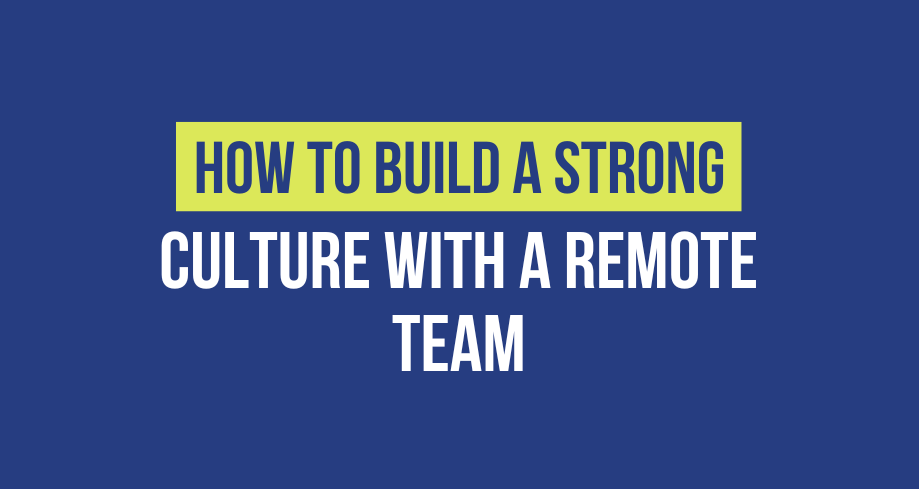As remote work continues to become the new normal, building a successful remote team has become increasingly important for businesses. Managing a remote team comes with its unique challenges, including communication issues and a lack of physical presence. However, with the right strategies, building a strong remote team culture is entirely possible.
Remote work has proven to be a viable option for businesses of all sizes, providing numerous benefits such as increased productivity, reduced costs, and a wider pool of talent. However, it’s crucial to acknowledge that remote work is not a one-size-fits-all solution and that it requires a different approach to managing teams than traditional in-office work. Therefore, it’s essential to develop the right strategies to ensure that your remote team is working effectively and efficiently.
In this article, we will explore some essential steps on how to build a strong culture with a remote team.
Hiring effective remote team members
Building a successful remote team starts with hiring the right people. New hire remote employees require different skills than in-office workers. They must be self-starters who can work independently, manage their time effectively, and possess excellent communication skills. When hiring remote workers, it’s essential to prioritize soft skills like communication, collaboration, and time management. Additionally, look for candidates who have experience working remotely or who have demonstrated the ability to work independently.
When hiring remote workers, it is important to focus on skills that are critical for remote work success. These skills include excellent communication skills, time management skills, and the ability to work independently. Effective communication skills are vital for remote work, as the team will communicate mainly through technology. Time management is also a critical skill to have as remote workers will not be supervised physically, so they need to manage their time effectively. Look for candidates with experience in remote work or those who demonstrate the ability to work independently. When interviewing candidates, ask questions that will help you assess their communication skills and their ability to work independently.
Thanks to Sanjay Gupta, Owner of Gurin Products
Effective communication methods in a remote work culture
Communication is key to any successful team, but it’s even more critical when it comes to remote teams. Remote workers don’t have the luxury of popping by someone’s desk to ask a question or clarify a task. Therefore, establishing clear communication channels and protocols is essential. You should schedule regular check-ins and team meetings to discuss progress, share updates, and address any issues or concerns. Additionally, it’s crucial to use the right tools for communication, such as video conferencing, instant messaging, and project management software.
Effective communication is critical for the success of a remote team. When working remotely, team members can easily feel disconnected, which can lead to miscommunication, errors, and delays. Regular communication through virtual channels can help establish a connection and increase accountability. Setting clear communication protocols, including scheduled check-ins and meetings, ensures that the team remains informed and on the same page. Video conferencing, instant messaging, and project management software can also be used to maintain clear communication channels between team members.
Thanks to Simonas Steponaitis, a Marketing Manager at DoFasting
Set clear expectations to maintain strong company culture
Clear expectations are critical when managing a remote team. Without them, remote workers may struggle to understand their role or what is expected of them. To set clear expectations, define the goals and objectives of the team and each team member. Additionally, establish a clear and consistent process for communication and collaboration. Set clear deadlines and milestones for projects and tasks, and provide detailed instructions and guidelines for tasks and projects.
Setting clear expectations is critical for remote work. Team members need to understand what is expected of them, what their goals are, and what their deadlines are. To ensure that everyone is on the same page, establish a clear process for communication and collaboration. Set clear goals and objectives for each team member, and regularly communicate expectations and goals to keep everyone informed. Additionally, provide detailed instructions and guidelines for tasks and projects to avoid confusion.
Thanks to James White, Managing Director at Media First
Establish a strong remote company culture
A strong team culture is essential for any successful team, including remote teams. To build a strong culture, develop a mission statement and core values that reflect your company’s culture and values. Fostering a sense of community and belonging by encouraging team members to share their interests and hobbies can also help. Celebrating team successes and milestones, as well as encouraging teamwork and collaboration by creating opportunities for team members to work together on projects and initiatives, can also promote a strong team culture.
Building a strong team culture is critical for the success of a remote team. Establishing a clear mission statement and core values that reflect the company’s culture and values can help foster a sense of community and belonging. Encouraging team members to share their interests and hobbies can help promote a positive team environment. Celebrating team successes and milestones is also important to
Thanks to Jonathan Rogers from Credexel
Prioritize collaboration and team-building activities in a remote environment
Building a successful remote team requires more than just getting work done. It’s also about building relationships, fostering a sense of community, and promoting collaboration. To prioritize team building and teamwork, consider hosting video calls and virtual team-building events like online games, virtual happy hours, and team lunches. These events provide an opportunity for virtual employees to get to know each other and build relationships. Additionally, creating opportunities for team members to work together on projects and initiatives can promote collaboration and teamwork. Collaboration tools like Google Docs or Miro can be used to facilitate teamwork and brainstorming. By promoting a collaborative and supportive work environment, you can boost team morale and productivity.
Provide opportunities for professional development Just like in-office employees, remote workers also need opportunities for professional development. Providing your remote team with opportunities for learning and growth can help them stay engaged and motivated. Encouraging them to attend webinars, online courses, and conferences can help them develop new skills and stay up-to-date with industry trends. Additionally, offering mentorship programs or coaching sessions can help remote workers grow in their roles and advance their careers. Providing your remote team with opportunities for growth and development can help you retain top talent and maintain a competitive edge.
Thanks to Andrew Cooper owner of Simply E-Liquid
Provide resources for employee well-being and mental health
Working remotely can be isolating and may take a toll on an individual’s mental health and well-being. Therefore, it’s crucial to provide resources and support for mental health and wellness. Consider offering virtual counseling sessions, mindfulness training, or meditation sessions to help your team manage stress and maintain their mental well-being. Encouraging regular breaks, exercise, and healthy habits can also contribute to a positive well-being and healthy work environment. By prioritizing the mental health and well-being of your remote team, you can create a more supportive and productive work environment.
Thanks to Alan Perkins Co-Founder at RadialZone.com
Foster a sense of inclusivity and diversity
Remote teams can consist of people from all over the world with different backgrounds, cultures, and perspectives. To build a successful remote team, it’s important to foster a sense of inclusivity and diversity. Create an environment where everyone feels valued, respected, and included. Encourage open communication and create opportunities for team members to share their perspectives and ideas. Providing training and education on diversity and inclusion can also help create a more inclusive and welcoming team culture. By fostering a sense of inclusivity and diversity, you can create a more innovative and creative team.
Thanks to Rene Delgado, Founder & CEO at Shop Indoor Golf
Conclusion
Building a successful remote team requires a combination of the right people, effective communication, clear expectations, the right tools and technology, team building, professional development opportunities, resources for mental health and wellness, and fostering inclusivity and diversity. By prioritizing these strategies, you can create a strong, engaged, and productive remote team that delivers results and contributes to the success of your business. Building a successful remote team is an ongoing process that requires adaptation and regular feedback. By creating a positive and supportive remote work environment, you can empower your team to thrive and succeed in their roles.
FAQs
What qualities should I look for when hiring remote employees?
When hiring remote workers, it’s essential to prioritize soft skills such as communication, collaboration, and time management. Look for candidates who have experience working remotely or who have demonstrated the ability to work independently. Additionally, consider their technical skills and their ability to adapt to different technology and software.
How can I ensure that my remote team stays productive?
To ensure your remote team stays productive, establish clear expectations and deadlines for projects and tasks. Use project management software to track progress and ensure that everyone is on the same page. Additionally, provide regular feedback and coaching to help remote workers stay on track and improve their skills.
What are some effective ways to promote teamwork and collaboration among remote workers?
To promote teamwork and collaboration among remote workers, and create opportunities for them to work together on projects and initiatives. Use collaboration tools such as Google Drive or Dropbox to allow team members to work on documents and files together. Host virtual team-building events such as online games or virtual happy hours to foster a sense of community and build relationships.
How can I ensure that your entire team is communicating effectively?
Establish clear communication channels and protocols to ensure that your remote team is communicating effectively. Schedule regular check-ins and team meetings to discuss progress and address any issues or concerns. Use the right tools for communication, such as video conferencing, instant messaging, and project management software. Encourage open and transparent communication, and be available to answer any questions or concerns your team may have.
How can I foster a sense of inclusivity and diversity within my remote team?
To foster a sense of inclusivity and diversity within your remote team, create an environment where everyone feels valued, respected, and included. Encourage open communication and create opportunities for team members to share their perspectives and ideas. Providing training and education on diversity and inclusion can also help create a more inclusive and welcoming team culture. Additionally, be mindful of any cultural or language barriers and provide resources and support to help bridge those gaps.




